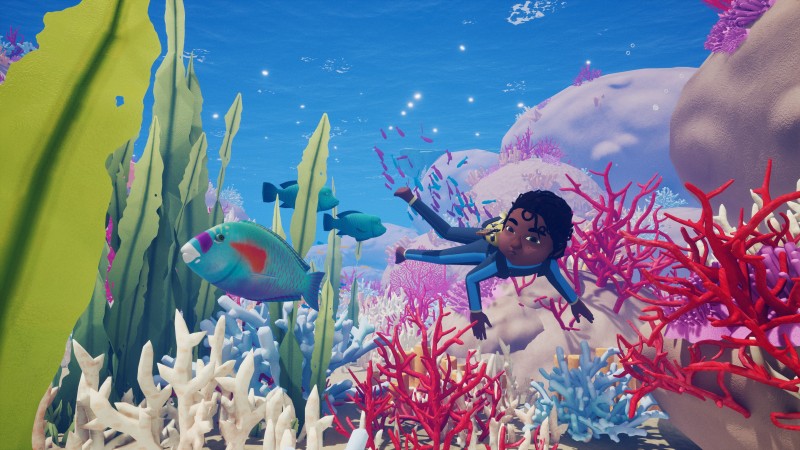Video games, unfairly simplified, all present a series of virtual tasks that must be performed in order to progress, and the player must decide whether they enjoy performing those tasks. In some ways, Tchia eschews the idea of making you do anything by offering an open, exploration-based game full of activities where, in almost every case, completing them is optional. Don’t want to play a rhythm game with cutscenes? To auto-play it simply press the left control stick. Don’t want to do the rock stacking minigame? move along. Don’t feel like taking your boat? Jump into the soul-a bird and just fly towards your destination. Want to skip this entire gameplay section? There is an option in the menu to do this. If, however, you want to delve into what Tachya has to offer, it’s a unique package wrapped up with some well-executed gameplay mechanics into a relatively short but totally fun full-fledged experience.
Tchia begins with a note from the developer outlining exactly what it’s trying to do, and it does a great job setting the tone of the world and experience. You explore a magical, fantasy archipelago heavily inspired by New Caledonia and its traditions. The story follows the titular Tachia and the adventure of rescuing her kidnapped father. The character designs are reminiscent of an animated children’s TV show, but the movement, especially small detailed animations such as close-ups of the hands, are superb. Aesthetics also deceive, which sometimes have a surprisingly dark tone. The big bad, Mevora, is presented in such a dark and comical way that I both gasped and laughed out loud. There is surprising violence, and inappropriate jokes are told, all in stark contrast to the children’s scene, and it quickly made me a fan.
Overall, the story is a charmer with fun characters, surprising twists and a satisfying conclusion, but it’s ultimately only a small part of the game. Most of your time in Tchia is spent transforming into different animals to explore the island and find fun around every corner. Tchia can climb every surface and use a paraglider like Link in Breath of the Wild, and it looks great. It’s always fun to climb a tree, leap from the top, and unwrap your paraglider to land safely on the ground, and when that’s not taking you fast enough, Tachia’s animals and objects have spirit- The jumping ability makes running even better.
Tchia can slow down time and leap across every animal in the game as well as nearly every inanimate object. Some are meaningless but novel, like the lizards, but others are extremely useful, like the assorted deer on the island that allow you to sprint at high speed. However, the best and my most used transformations are birds. Leaping into a bird, flying to my destination, returning to human form, and paragliding to safety is an action I replayed over and over and never tired of.
Combat doesn’t exist in the traditional sense. Tachia cannot throw a punch, but she can hurl flammable objects at clothed enemies in an explosive performance. As with most activities in the game, fighting like this is optional, but I was forced to do it to the point of exhaustion. This was one instance where I grew tired after the initial glow of the mechanics wore off.
I also found some distracting, but thankfully not game-breaking, bugs where cutscene elements would not load properly, causing characters to act out events strangely or in blank spaces. It was never a huge problem, but whenever it popped up, it broke the immersion.
Tchia is brimming with joyous, exploratory fun. The idea of turning players loose in an interactive sandbox is a goal that has been pursued by developers since the beginning of video games. Only a few really give you the freedom to play in a virtual playground, and although Tachia is not without its drawbacks, it is a rare example where the allure of playing in the digital world is being rewarded at almost every turn. The vocals, music, and Tachia’s abilities all come together to create something that’s fun, and it all takes place in a setting that begs to be explored.
